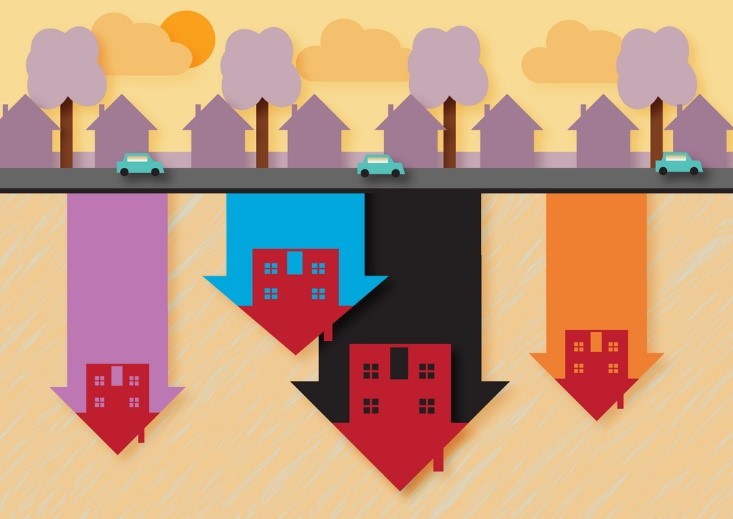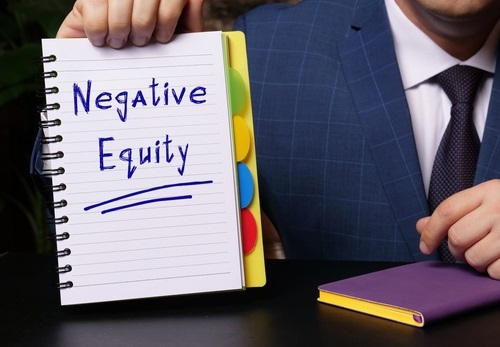
How to Prepare for a Successful Move to Denver: a Step-by-Step Guide
Moving to a new city can be both exciting and overwhelming. Denver, known for its vibrant culture, stunning natural beauty, and thriving job market, is

Nobody wants their mortgage to go underwater or turn upside-down, as realtors casually call it. It puts you in a position where you have to keep up with market forces you have no control over just to break even. Until you do, your investment is a liability that can’t be shaken off even if you wanted.
With negative equity, it’s impractical to sell the house because the proceeds will be insufficient to pay off your loan, so the sale can’t be closed.
Prospective buyers also can’t get financing as lenders are unwilling to finance more than the property’s value, which is needed to clear the mortgage. You are forced to keep making payments for the loan, willing the house’s value to appreciate.
The situation worsens if, for some reason, you have to relocate or you find yourself struggling with the mortgage repayments, so you need to sell the house.
The shortfall in equity coupled with the costs of a new house will have you asking yourself if it is possible to sell a house with negative equity. It doesn’t have to be the end of the world.
You can sell a house with negative equity. However, there are many obstacles that we shall address in the course of this article.
This position will force you to make alternative payment arrangements with your lender to cover the shortfall. Be prepared to be offered lower prices than what you listed and a potential short sale conversation with your lender.
The proceeds from the sale of the house are supposed to go towards paying off the existing mortgage, which is upside-down, meaning they won’t be sufficient. Therefore, the lender cannot close your loan account, making them hesitant to allow you to sell the house without a plan.
The negative equity position can be confusing, considering lenders will not fund more than the property is worth. How does the loan balance become more than the value of the house? Each mortgage has its unique story, but these are the common causes of negative equity.
You might have bought the house during a sellers’ market and paid a high price on it because there were multiple competing bids, or you bought it at an auction. As the market stabilizes, the demand decreases and prices correct themselves. Subsequent appraisals will show the house’s true value, which will be lower than what you bought it for.
Some locations naturally have turbulent property prices; mining towns, for instance, will experience high demand at the onset when the minerals are discovered, which fades as the mining activity reduces.
The more repairs the property needs, the less attractive it becomes to potential buyers and the lower its value. The damage can be so bad that the value goes below the loan amount.
Because most of the loan principal is still intact, interest and penalty accumulation are highest at the initial stages of the loan. The mortgage balance will surpass the value of the house after a few months of default.
In most cases, you will not know that you are in negative equity until you want to sell the house. Listing it without factoring in how to come up with the difference may lead to aggravated losses that can be avoided with a little preparation.


You should start by requesting a comparative market analysis (CMA) report, which will enable you to estimate the market value of the house through an evaluation of similar properties that were recently sold in the neighborhood. Real estate professionals use them to come up with fair asking prices.
Your local realtor will eagerly prepare one for you, hoping to get the business of listing the property and closing the sale once you decide. If possible, get a second and third opinion so you can have an unbiased market feel. At this point, you will have a good idea of the kind of bids you will get for the house if it is in decent shape.
Your lender will respond by issuing a written payoff statement capturing the amounts required to satisfy all the mortgage obligations at the time. It captures the mortgage balance, any interest accrued or rebates from early payment, and if there are any penalties or associated charges.
The amount on this statement is what should be cleared by proceeds from the sale of the house. Your negative equity is equivalent to the amount by which the payoff statement exceeds the market value of the mortgaged house.
An official home appraisal that an expert has done will also factor in the current condition of the specific house and expose any repairs that need to be made before prospective buyers discover them and use them to bargain downwards.
It allows you to decide in advance if the cost of renovations is bearable and whether it will be worth the value addition. You must decide which repairs will impact the selling price most and prioritize them. You can facilitate all the necessary renovations or decide to sell the house as is if the costs are unbearable or don’t seem to add justifiable value.
Once You have established how bad the situation is, you can opt for one or a combination of these approaches when selling the house.
This is the easiest and least expensive way to get out of negative equity so you can sell the house. Keep up with the mortgage repayments until you recover your equity. This way, you don’t have to rely on the market value to build home equity, but you still allow time for the market to adjust. It can be a long-term approach that won’t be practical if you need to move urgently.
You can increase your monthly contributions so that the home equity is realized faster or pay the difference in one or a number of lump-sum deposits. Once the negative equity is eliminated, you can sell the property as a normal transaction.
While considering this option, keep in mind the cost of getting a new home and moving in addition to covering the shortfall. You need to have sufficient savings for both to avoid coming out on the losing side of this transaction.
Once you get the CMA reports, you can tell what similar houses in the neighborhood have that your house doesn’t. You can even visit the properties for viewing. Figure out what it will cost to install them with the help of a professional. Consider details like landscaping, security features and the condition of the property.
A home in disrepair worsens the negative equity position because the repairs will either be an added cost on top of the payoff statement, or the property’s market value will go down on account of the state of the house if sold as is.
It is safe to commit to renovations only when the repairs are critical for the house to sell or the value-add is guaranteed to cover the repair cost. Avoid incurring more debt for renovation as it worsens the equity position.
Repairs and renovations should increase the home’s value, but in some cases, the amount of expenditure required to bring it back to positive equity is more than the value addition, or the funds for the renovation are just not available.
There are cash buyers whose specialty is purchasing properties that are otherwise hard to move. They buy them as they are, undertake the necessary renovations and flip them for a profit.
While they will offer less than the market price to protect their margins, they are not put off by liens or negative equity and will always have ready cash for speedy transactions.
This option allows you to sell the house as is without incurring repair costs that you would otherwise need to because regular buyers are not keen on taking up repairs for their new home.
This loan allows you to add the outstanding amount of your current mortgage onto a new mortgage that will be purchasing your new house. Before your old mortgage account is closed, the balance is loaded onto the new mortgage. The market value of the new house should cover its mortgage plus the negative equity value of the existing mortgage.
The lender will give instructions for an appraisal to confirm this before approving the mortgage. They will also appraise your financial position to establish that you meet their eligibility criteria requirements. The process should be faster as they already have your credit history, especially if your current payments are up to date.
This is a voluntary resolution that you can request your lender to consider. You sell the house at the going rate, and all the proceeds go towards clearing the loan. The lender might agree to this option if it is established that you cannot service the mortgage, even with revised terms.
You can also devise a repayment plan for the outstanding amount after the sale instead of writing it off. A short sale should be avoided whenever possible as it negatively impacts your credit score, although it is not as bad as a foreclosure.
The lender may allow a short sale on the condition that the outstanding amount is paid in full over a certain period or as a lump sum. You can source financing from other avenues like personal loans and sell other assets or properties to raise funds so the mortgage account can be closed. This will free you up to look for a cheaper house.
Preparing an exit strategy before listing a home is important so it can be sold ideally when it is at its peak price.
Thinking about how to find a cash buyer for your home? WeBuyHousesInDenver.org is your solution to selling a house for cash.
Quit thinking on how to find a cash buyer for your home. We buy houses in any condition. Sell your house for cash!
Selling a house for cash is made easy with us. Call us now and we’ll make it fast and easy for you!

WeBuyHousesinDenver.org is a cash for houses company and we are experts at buying houses in Denver and all of Colorado. Our mission is to give the people of the Mile High city the best solution to sell any house. When you sell your house to us there are:
This is how selling a house in Denver should be!
Fill out the form to get your no-obligation cash offer today.
The latest real estate news, forecasts, insight, and advice are brought to you by the leading authorities in the Denver housing market. We have ears and boots on the ground in the Mile High reporting the facts. Extensive research goes into all our articles and we gather information from trusted real estate experts, renowned local Denver housing specialists, home buyers, and more. We buy houses Denver and as accomplished professionals with a proven track record, we now want to share our experiences with you. Please enjoy!


Moving to a new city can be both exciting and overwhelming. Denver, known for its vibrant culture, stunning natural beauty, and thriving job market, is
Value add in real estate means finding ways to make a property more valuable. This can include things like renovating, improving operations, or changing how
Colorado Springs is a great location for rental property owners, but even in high-demand rental markets, selling your rental property sometimes makes financial sense. The
We’re a service-focused, home buyer that specializes in helping homeowners get rid of burdensome houses quickly. We are Colorado cash buyers who can buy your house fast with a fair all-cash offer. Imagine an instant online quote to sell as-is, without realtors and on your timeline! As a house buyer that’s what we offer. Therefore, if you need to sell your house fast and need a trusted professional home buying company look no further because we buy houses fast for cash.
We Buy Houses In Denver, 1337 Delaware St, Denver, CO 80204